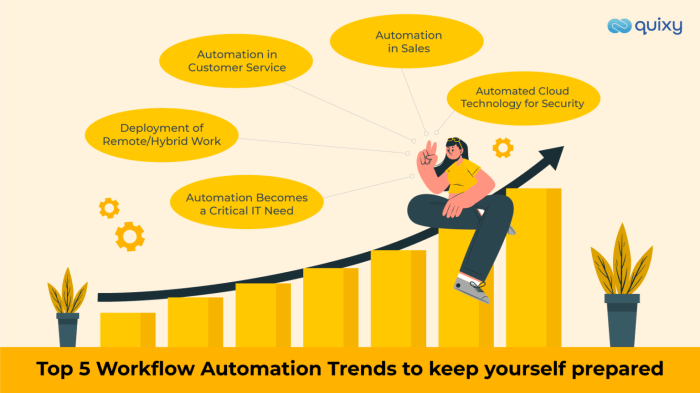Diving into the realm of Workflow Automation Trends in Global Business Operations, this introduction sets the stage for a captivating exploration of how automation is reshaping the landscape of global business operations.
As we delve deeper, we will uncover the key drivers behind the adoption of workflow automation, its impact on various industries, and the role of cutting-edge technologies in driving efficiency and productivity.
Overview of Workflow Automation Trends in Global Business Operations
Workflow automation plays a crucial role in streamlining and optimizing processes within the realm of global business operations. By leveraging automation technologies, organizations can enhance efficiency, reduce errors, and boost overall productivity.
The significance of workflow automation lies in its ability to eliminate manual tasks, facilitate seamless communication between departments, and accelerate decision-making processes. As businesses operate on a global scale, the need for efficient workflows becomes increasingly paramount to stay competitive in the market.
Examples of Industries Benefiting from Workflow Automation Technologies
- Manufacturing: In the manufacturing sector, workflow automation helps optimize production processes, track inventory levels in real-time, and improve supply chain management.
- Finance: Financial institutions utilize workflow automation to streamline loan approvals, enhance compliance processes, and ensure data security.
- Healthcare: Healthcare providers leverage automation to manage patient records, schedule appointments, and enhance the overall quality of care delivery.
Impact of Artificial Intelligence on Workflow Automation
AI has significantly transformed workflow automation processes in global business operations. By leveraging advanced technologies such as machine learning and natural language processing, AI has revolutionized how tasks are managed, streamlined, and optimized within organizations. These AI-powered solutions have enhanced efficiency, accuracy, and decision-making capabilities, ultimately reshaping the way businesses operate on a global scale.
Role of Machine Learning in Enhancing Automation
Machine learning algorithms play a crucial role in automating repetitive tasks, predicting outcomes, and identifying patterns within workflows. By analyzing large datasets and learning from historical data, machine learning models can optimize processes, identify bottlenecks, and make intelligent recommendations to improve overall efficiency.
For example, in supply chain management, predictive analytics powered by machine learning can forecast demand, optimize inventory levels, and enhance logistics operations.
Role of Natural Language Processing in Automation
Natural language processing (NLP) enables machines to understand, interpret, and generate human language, facilitating communication and interaction between systems and users. In workflow automation, NLP technology can automate document processing, extract key information from unstructured data, and enable chatbots to assist employees with inquiries or tasks.
For instance, in customer service operations, NLP-powered chatbots can engage with customers, provide real-time support, and escalate complex issues to human agents when necessary.
Examples of AI-Powered Workflow Automation Solutions
One prominent example of AI-powered workflow automation is robotic process automation (RPA), which uses software robots to automate repetitive tasks across various systems and applications. RPA can streamline data entry, invoice processing, and report generation, leading to significant time and cost savings for organizations.
Another example is cognitive automation, which combines AI technologies to mimic human cognitive functions and perform complex tasks such as data analysis, decision-making, and problem-solving. These AI-driven solutions are transforming global business operations by increasing productivity, reducing errors, and enabling organizations to focus on strategic initiatives.
Integration of Robotic Process Automation (RPA) in Workflow Automation
Robotic Process Automation (RPA) plays a crucial role in streamlining repetitive tasks within workflow automation, enhancing efficiency and reducing human error.
Efficiency and Scalability of RPA vs. Traditional Automation
When comparing traditional automation methods with RPA, the key difference lies in the level of efficiency and scalability. Traditional automation usually involves predefined rules and structured processes, while RPA can mimic human actions and adapt to changing scenarios more effectively.
- RPA allows for the automation of complex processes that involve multiple systems and applications, increasing productivity and accuracy.
- Unlike traditional automation, RPA can be easily scaled up or down based on business needs without the need for extensive reprogramming.
- RPA can handle unstructured data and exceptions more efficiently, reducing the need for manual intervention and speeding up the overall workflow.
Successful RPA Implementations in Global Business Operations
Several case studies demonstrate the successful integration of RPA in global business operations, resulting in significant improvements in productivity and cost savings.
- Case Study 1:Company X implemented RPA in their finance department to automate invoice processing. This led to a 40% reduction in processing time and a 50% decrease in errors.
- Case Study 2:Organization Y integrated RPA in their customer service operations to automate email responses and data entry tasks. As a result, they achieved a 30% increase in customer satisfaction and a 25% reduction in response time.
- Case Study 3:Business Z leveraged RPA for inventory management, reducing stock discrepancies by 60% and improving order fulfillment by 45%.
Cloud-Based Workflow Automation Solutions
Cloud-based workflow automation tools offer numerous advantages for global business operations. These tools are accessible from anywhere with an internet connection, allowing for seamless collaboration among teams spread across different locations. Additionally, cloud-based solutions eliminate the need for costly infrastructure investments and maintenance, making them cost-effective and efficient for businesses of all sizes.
Advantages of Cloud-Based Workflow Automation Tools
- Scalability: Cloud-based automation solutions can easily scale up or down based on the needs of the business, allowing for flexibility in handling fluctuating workloads.
- Flexibility: These tools provide the flexibility to customize workflows and processes according to specific business requirements, ensuring that they align with the organization's unique needs.
- Cost-Effectiveness: By eliminating the need for on-premises infrastructure, cloud-based solutions reduce upfront costs and ongoing maintenance expenses, ultimately saving businesses money.
Popular Cloud-Based Platforms for Workflow Automation
- Microsoft Power Automate: This platform offers a wide range of automation capabilities and seamless integration with other Microsoft tools like Office 365, making it a popular choice for businesses using Microsoft products.
- Zapier: Zapier allows users to connect multiple apps and automate workflows without any coding knowledge, making it a versatile tool for businesses looking to streamline processes across different applications.
- IBM Cloud Pak for Automation: IBM's cloud-based automation platform combines AI capabilities with workflow automation, providing advanced functionalities for businesses looking to optimize their operations.
Closing Notes

In conclusion, the discussion on Workflow Automation Trends in Global Business Operations sheds light on the transformative power of automation in streamlining processes, enhancing productivity, and fostering innovation in today's global business landscape.
Answers to Common Questions
What are the key benefits of implementing workflow automation in global business operations?
Workflow automation leads to increased efficiency, reduced errors, faster processing times, improved collaboration, and overall cost savings for businesses operating on a global scale.
How does AI contribute to enhancing workflow automation in global business operations?
AI technologies like machine learning and natural language processing enable advanced data analysis, predictive insights, and intelligent decision-making, thereby optimizing workflow processes in global business operations.
What are the main advantages of using cloud-based workflow automation tools?
Cloud-based solutions offer scalability, flexibility, remote accessibility, cost-effectiveness, and seamless integration capabilities, making them ideal for modern global business operations seeking streamlined workflows.













